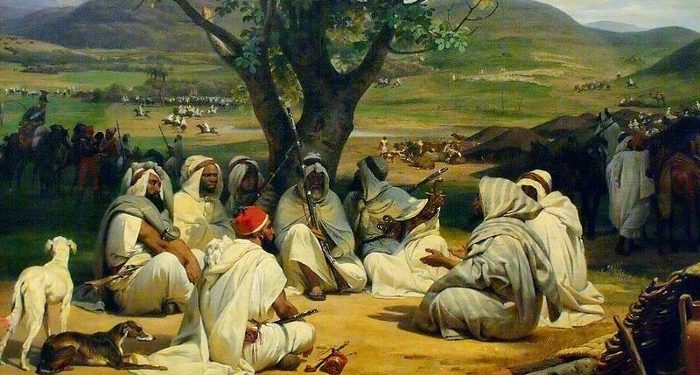As it must be disclaimed, the book ‘A revolutionary Approach to The Religion Problem’ is in its undeveloped, primitive form as self-criticized by the Peoples Leader, himself. These writings are not completely representative of the current stand of the PKK regarding the revolutionary approach to religion. There have been many developments released as part of defense writings ever since, due to constraints. Overall, the writings should be taken with a pinch of salt, as we continue to translate and analyze the topic.
ISLAM – Part One
After Christianity became an official ideology, it strived to be more influential in Middle Eastern societies. Istanbul is the center of this. Again Damascus is very important, it is a center; Antakya is just as so. But there are primitive tribes in the Arabian Peninsula. They were not fully involved in the Jewish religion or in Jesusism. In other words, they are not members of Christianity. Then, what religion do they belong to? As far as it is known, there are Lad and Fad gods in the Kaaba; these are tribal gods.
There are 360 idols in the Kaaba. The more Arab tribes there are the more idols. The number doesn’t matter so much, but the point remains. Let us not forget, again, then there is a religious segment form as the basic frame of ideological environments. In particular, there are Judaism and its people, the Jews, who claim to be the most developed representatives of the developing society. They are effective in city civilization and trade. On the other hand, there is Christianity. Although it contradicts Judaism, it is an official religion, the religion of the state, a dominant religion in Damascus, north of the Arabian Peninsula.
A very powerful civilization is built here. It still remains and is magnificent. Strong colonies were formed targetting the inner parts of the Arabian Peninsula. Nearby points of interest include churches and monasteries. There Christians, priests conduct the activity; even when Muhammad first came out and was conducting trade, he made contact with them. He observes Jewish merchants and realizes how cruel and unforgiving they are. He sees how the trade developed in the Arabian Peninsula was blocked by Judaism and how Jewish merchants dominated the markets. Likewise, Christian priests are in a stronger position. They are financially strong; they also receive the support of the state. In other words, they are dominant. So this means that Muhammad cannot accept either religion.
Because it is against his commercial interests. Judaism and Christianity do not recognize the right to life, but let us not forget that both Jesus and Moses emerge in Palestine. They emerge in a similar reality of Arab tribes. There is a tradition of prophets, 124 thousand prophets are mentioned. It seems that in every tribe, regardless of their various sizes, a prophet has appeared. The tradition at that time was a prophetic tradition. Life without prophets is unthinkable. Ungodly life is unthinkable. Every pioneer that emerges shows itself as a prophet. The prophet of the tribe, the prophet of the people, the prophet of humanity; the social truth of the stage is exactly that.
The truth is better understood when we take a look at the situation of Arab tribes, especially those that are underdeveloped. Jews on one side, Arabs on the other; a significant part of the Sami race is empowered in the form of the Jewish people. They see themselves as the most distinguished tribe of humanity. Those who accept Christianity again form the more advanced segment; this has some weight, particularly in Trade.
The rest of the desert is seen by those tribal-clan religions, as very backward, unfamiliar with the idea of the state, alien to the idea of humanity; they function in a position of material anarchy, which should never be accepted in the conditions of that day. Their interests from all four sides are at stake. These are material facts, but on the other hand, there is a rising civilization across them. There are civilizations developed by Judaism and Jesusism. Just below them, there are contradictions in Abyssinia, even in Yemen; there are civilizations built by feudal societies on the one hand and the backward Arab tribes in the hot desert.
Muhammad grows in these conditions and sees these contradictions, he is encircled by Christianity and Judaism, and every pioneer that emerges there proclaims himself a prophet. Then what will he do? Under these conditions, he throws himself into business. He feels the need to be a force, but the Arab tribes and tribal gods are extremely opposed to the authority and order he wishes to develop. The Quraysh tribe among other tribes, do not accept the idea of the Arab tribe or the idea of an Imam.
They were immersed in tribal and tribal deity until their marrow. So if he wants to move forward, he must be against the tribal religions and tribal communities as well as the official religions at the time. It should consider to be against the Roman Empire, which considers slavery to a significant extent, and to turn from tribal order to the peoples’ order, from tribal authority to state authority. The most concrete ideological framework of this is the shift from the religion of the community to the religion of mankind.




